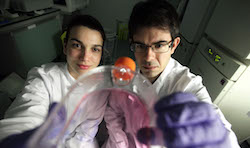 |
| João Passos and Clara Correia-Melo in the lab--Courtesy of Newcastle University |
As we age, our cells accumulate damage and have increased inflammation. A team of scientists led by Newcastle University's João Passos has found a way to turn back the clock, proving for the first time that mitochondria are triggers of cell aging. When they eliminated the mitochondria from aging lab-grown human cells, the cells displayed characteristics of younger cells.
The mitochondria-less cells showed lower levels of oxygen free radicals and inflammatory molecules--levels that would be expected in younger cells.
"We already had some clues that mitochondria played a role in the aging of cells, but scientists around the world have struggled to understand exactly how and to what extent these were involved," Passos said in a statement. "These new findings highlight that mitochondria are actually essential to the ageing of cells."
But what happens when you eliminate the "batteries" of a cell, which are necessary for energy production and other metabolic functions?
"There are obvious negative consequences for cell when losing mitochondria, since mitochondria are implicated in many processes in the cell," Passos told FierceBiotechResearch in an email. "We definitely do not advocate the idea of losing mitochondria as a therapy for cellular rejuvenation," Passos said. The research served as a proof-of-principle experiment to prove the link between mitochondria and cell aging. Passos added that the team only studied the cells for a month, necessitating further work on the long-term effects of mitochondria loss on cells.
The research takes the team, which includes scientists from the U.S. and U.K., a step closer to a therapy that could counteract cell aging. They are now looking to find therapies to improve mitochondria function to counteract cell aging. In the paper, published in The EMBO Journal, they point to the immunosuppressant rapamycin, which, in mice, improved mitochondria function and reduced their number during cell aging.
In a similar tack, San Francisco-based Unity Biotechnology is working on a drug that clears the body of aging cells. A preclinical study published last week in Nature showed that regularly using the drug to scrub the body of "senescent" cells preserved tissue and organ functions, delayed tumors and extended lifespan up to 35% in aging mice. Unity's mission is to develop therapies for age-related diseases such as glaucoma, arthritis and heart disease by targeting "senescent" cells.
- here's the release
- and here's the study